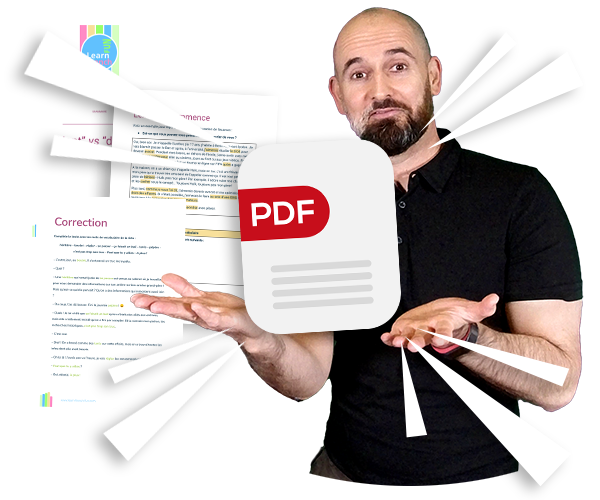If you’re a French student, you know that there are a few verb moods to worry about. But don’t worry, it’s not as bad as it seems!
In this post, we’ll take a closer look at the different verb moods in French, and we’ll give you some tips on how to use them correctly, in this way, you can achieve the best possible score in the DELF B2 exam 💪

PDF Bonus
We have prepared a free PDF to help you understand and master the 7 moods and 23 tenses in French.
👉 Download it for free
At the end, you will have exercises to practice with the correction. 👍
4 personal moods in French
There are four personal moods in French: the indicative, the subjunctive, the conditional, and the imperative. Each mood has a different function, and thus expresses different things.
Indicative (indicatif)
The indicative mood is used to express facts and opinions. It is the most common mood, and is used in nearly all everyday conversation.
Example: Je fais du sport
It’s something objective. I do sport! It’s not a guess, it’s not a hypothesis, no, it’s objective.
Subjunctive (subjonctif)
The subjunctive mood is used to express doubt, uncertainty, or wishes. It is often used in conjunction with the phrase “que” (that) and other locutions (bien que, il faut que…).
You can also read this article on irregular verbs in the subjunctive.
Example: Il faut que je fasse du sport
Here, I conjugate the verb faire in the subjunctive because I’m using the locution il faut que.
Conditional (conditionnel)
The conditional mood is used to express what would happen if something were true. It is frequently used to be polite.
It is often used with the word “si” (if) in the sentence structure: Si + imparfait, alors + conditionnel
Example: Je ferais du sport si j’avais le temps.
In this sentence, the verb faire is conjugated in the conditional, as we’re in the typical case of a hypothesis.
Imperative (impératif)
The imperative mood is used to give commands, orders or advices. It is generally used with the form vous (you), but can also be used with other forms tu (you) and nous (we).
Read this article if you want to know everything about the imperative.
Example: Fais du sport !
It’s an order or advice, so we conjugate the verb faire in the imperative.
Do you like learning French with videos?
Receive our free video newsletter every Friday in your e-mail box. You will get 3 “Tips & Tricks” on grammar, vocabulary, phonetics or French culture.
👉👉 Sign up now!
3 impersonal moods in French
In French, there are also three impersonal moods: the gerund, the infinitive and the participle.
The characteristic of a French impersonal mode is that it is not possible to use personal subject pronouns, except for il/ce (he).
When I say: Il fait beau. I use an impersonal form. The word il does not correspond to anything. It is only the grammatical subject.
Well, the gerund, infinitive and participle have the same characteristic. There are impersonal mood.
Gerund (gérondif)
The gerund mood is used to express the circumstances of the action of the main verb. These circumstances can be simultaneity, cause or manner, condition and opposition.
You will find a complete article and a video that explains the gerund in detail.
Infinitiv (infinitf)
The infinitiv mood: very often students are surprised when I tell them that the infinitive is a mood. In fact, it is simply used to designate the verb without any conjugation.
Participle (participe)
The participle mood is used to allow the verb to be used as an adjective and, of course, in the conjugation of all compound tenses.
Let’s talk about the tenses.

Difference between tense and mood in French?
The difference between the tense of a verb and the mood in the French conjugation is in the steps of each. We could say that :
- the mood of a verb is step #1
- and the verb tense is step #2.
When you speak, you will first choose the mood, then the tense.
- Do you want to say something polite?
- Step 1: You choose the conditional.
- Step 2: in which tense.
Or:
- Do you want to say something sure?
- Step 1: You choose the indicative.
- Step 2: And after, in which tense: présent, futur, passé composé…
and so on.
And then there is the question of the verb tense!
That’s why in each mood – the 7 moods – there are different tenses.
And some moods have many more tenses available than others.
For example:
- In the indicative, you’ll find 4 simple and 4 compound tenses.
- While in the conditional you will find only one simple and two compound tenses.
But don’t worry, not all the tenses of the French conjugation are used by the French! So you will never need to know them all.
Simple vs. compound tense in French conjugation
In all the moods, you will find two main categories of tenses:
- simple tenses
- compound tenses
The compound tenses are always composed of :
être (to be) or avoir (to have) + the past participle.
It is only the conjugation of être or avoir that will change.
📌 So you must know perfectly the conjugation of être and avoir!
Know that everything you have learned about the compound tense will work with all compound tenses:
- the choice of être or avoir
- past participle with final -e, -s, -es or nothing
- the position of the negation words
- the position of pronouns
- everything!
And to help you master French conjugation, we have specially designed a course that explains everything. Check it out below:
French indicative tenses: present, future and imperfect
These three tenses of the indicative: the present, the future and the imperfect are very important to know perfectly.
Why are they important? Because then you can conjugate all the other tenses by knowing them.
Example:
- The present conditional?
- It is the basis of the future tense and the ending of the imperfect tense
or,
- The present subjunctive?
- This is the basis for the present tense “ils” and the present tense endings of the verbs -er for je, tu, il/elle/on and ils. And it is like the imperfect tense for nous and vous.
etc
✔️ French QUIZ
French conjugation:
modes and tenses
Before leaving, let’s take this little quiz together to see if you understand 😀
Results
#1. Quel est le mode utilisé dans cette phrase : Hier, j'ai mangé au restaurant.
#2. Quel est le mode utilisé du verbe "pouvoir" : C'est super que tu puisses chanter ce soir.
#3. Quel est le mode utilisé dans cette phrase : On voyagerait à travers le temps et l'espace...
#4. On utilise l'indicatif pour une information objective.
#5. Connaître parfaitement les conjugaisons du présent, du futur et de l'imparfait permet de former toutes les conjugaisons.
That’s it for our quick tour of French verb moods!
As you can see, there are quite a few different ones to remember, but with a little practice you’ll be conjugating like a pro. And don’t forget – the best way to improve your French is to get out there and use it as much as possible!
Speaking with native speakers will help you learn all the nuances and subtleties of this beautiful language. So what are you waiting for? Bon courage et à bientôt !
Articles that might interest you:
- The Imperative in French: How to Conjugate Verbs in Imperative? When do You Have to Use the Imperative?
- The 10 Irregular Verbs in the French Subjunctive Mood
- Depuis, pendant, en, il y a, dans
- All the secrets of the French gerund!
- French verb moods
- How to use the tonic pronouns in French?
- How to use “en” and “y” pronoun in French?
- Difference between DONT and DUQUEL in French
- 10 common French verbs conjugated in the present tense. Beware of traps!
- The Direct Object Complement in French (C.O.D.) and direct complement pronouns (le, la, les…)







3 thoughts on “French verb moods”
Comments are closed.